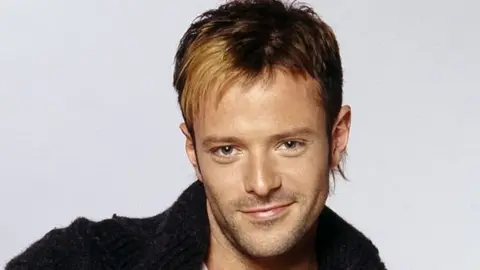Eurovision: Which parts of the UK have performed best?
 BBC / Jonahan Birch
BBC / Jonahan BirchWhen Mae Muller performs at Eurovision this year, she will join the ranks of Lulu, Cliff Richard and Sam Ryder as a solo act that has represented the UK at the contest.
She will be the seventh solo act born in the capital to do so, the most for any region.
This is no surprise to previous entrant James Fox, who said London was "the epicentre of the music world".
But an expert in Eurovision says talent has come from across the country.
Since 1957, the UK has performed at Eurovision 64 times. Of those performances, 41 were by solo acts.
Dr Paul Jordan, known as Dr Eurovision due to his PhD in the contest, said: "It's not all about London.
"We have brilliant talent in the North West, as we'll see when Liverpool host Eurovision, as well as not forgetting the other countries that are part of the UK too."
The East of England is currently tied with London, having sent six solo acts to the contest.
While the South West is the only region never to be represented by a solo act at Eurovision.
But it is Wales that punches above its weight. Despite making up just 5% of the UK's population, five of the UK's solo acts not born overseas are from there, 14% of the total.
Mr Fox, born in Cardiff, said song was "woven into the fabric of Wales".
But which part of the UK has performed best at Eurovision? It depends on how you define it. Unfortunately, 42 solo acts is a small sample from which to draw conclusions.
Scotland and the East of England are the only parts of the UK with solo acts that have placed first at the contest, Lulu and Sandie Shaw respectively.
The UK's other three victories were by bands: Katrina and the Waves, Brotherhood of Man and Bucks Fizz.
Group performances were not included in this analysis, due to the difficulty of weighting the contributions of every band member and finding all necessary biographic information.
The West Midlands has only had one solo act make it to the contest - Michael Ball in 1992. But he came second with One Step Out of Time, beating 95% of the other countries that performed. That gives the region the highest average performance.
Dr Jordan said Mr Ball was "a really good example of someone who's got brilliant performance ability".
"He was tremendous, and I think it's a really good example of a very average song given a brilliant performance," he added.
The North East has the lowest average performance at Eurovision. Michael Rice is the only UK solo act born there and in 2019 he came last with Bigger than Us, scoring only 11 points.
Yorkshire and the Humber have the dubious honour of providing the only UK solo act to score nil points. James Newman, the third solo act born in the region, failed to score any points in 2021 with his song Embers.
Dr Jordan argues a song failing to score does not mean it is terrible. Rather, "it's about failing to resonate with people. There's been plenty of times where songs have just kind of fallen off the radar."

When Mr Fox performed Hold On to Our Love in 2004, he came 16th. "Thinking back, maybe I should have had fireworks coming out of the guitar or something. It's one of those songs there's not a lot more you could do to it. It really didn't involve a dance routine."
But he says Mae Muller's entry, I Wrote a Song, is perfect for Eurovision. "I listened to it once, and instantly like an ear worm it's stuck in my head. and I think that's the key to this contest," he said.
Dr Jordan argues success at Eurovision requires three things: "a good song, a good performer, and a good performance."
"I'm hoping for that with Mae Muller this year. Certainly it is a good pop song; but whether or not it will turn into votes on the night depends on that performance."
He argues Ukraine, who won the 2022 contest, also understands the importance of a strong performance.
Although they have a "rich tradition of musical diversity", he adds, "crucially they know how to stage a song, and Ukraine do very well, even when their songs are not that strong."
